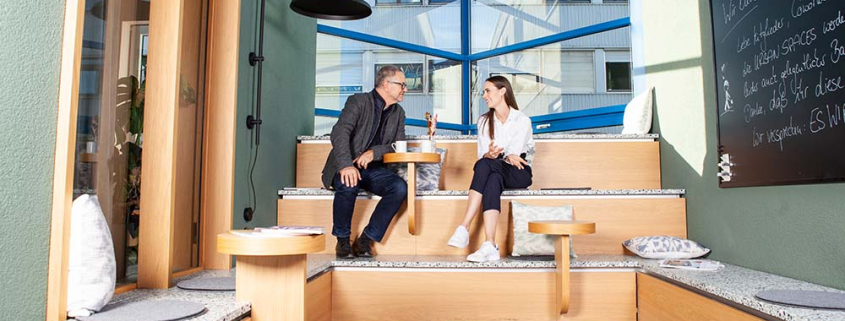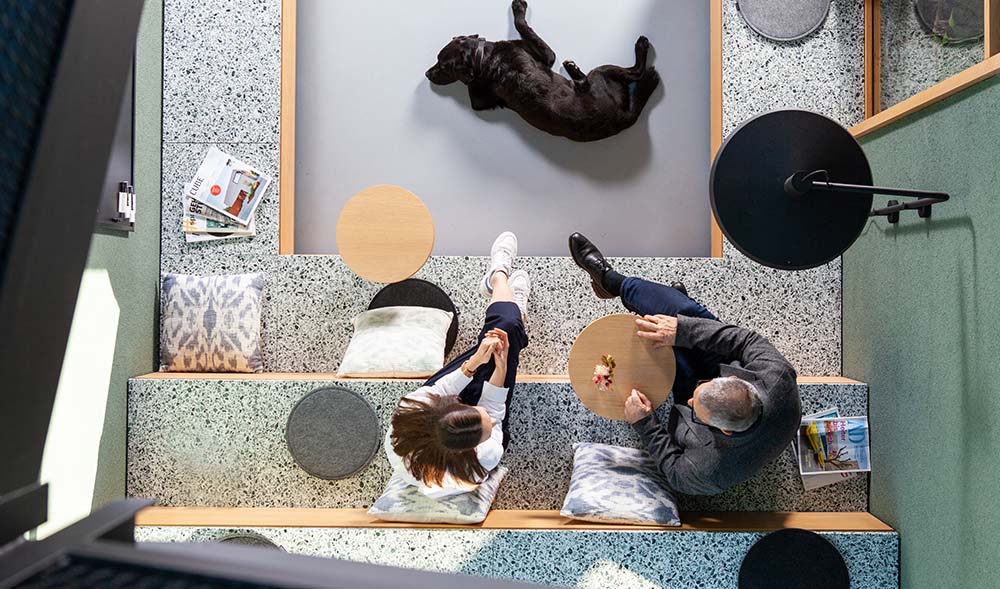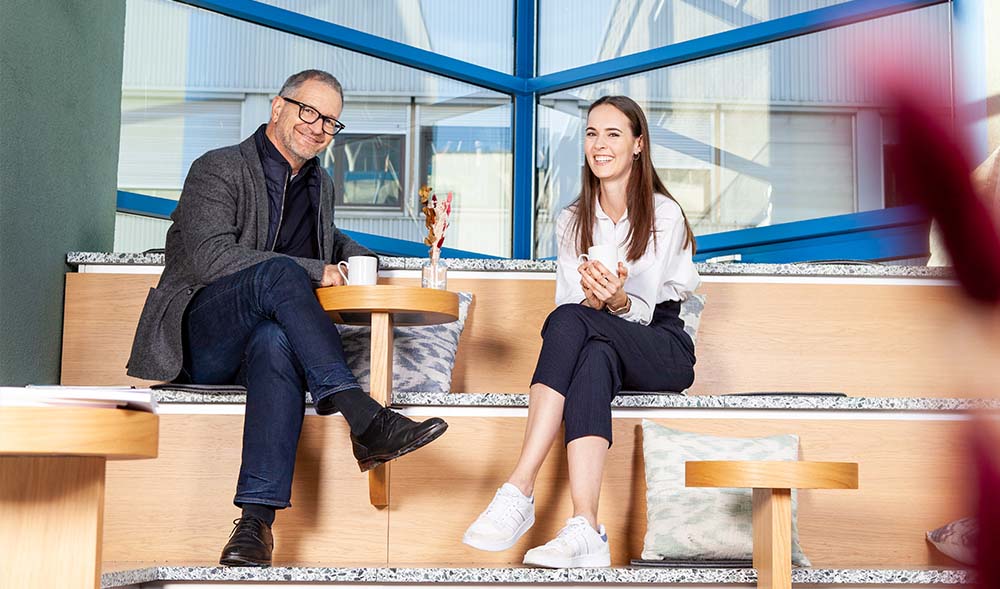Our colleagues Markus and Rebecca recently discussed if offices still match the zeitgeist, to what extent New Work influences the relationship to customers and how they imagine the workplace in twenty years. As co-founder of Communication Consultants (CC) in Stuttgart, Markus has seen the workplace change in the last 25 years. Junior Social Media consultant Rebecca usually works from home and brings in her perspective.
Rebecca, what does your dream workplace look like?
Rebecca: For me, the optimal workplace is less a specific place – more a combination of different requirements: For example, I need a separate area, quiet and a certain flexibility. But I am just as happy to have a kind of haven in our CC office, where I can meet my colleagues.
Markus, who still needs an office?
Markus: We do. Maybe not in the traditional form, but as a space to meet. I recently read an exciting article about an agency that closed its office and bought an inn for the employees as a place to meet and exchange ideas. I am convinced that both extremes of work models – only at home alone or only in the office – can be exhausting in the long run.
Nearly everyone worked from home during the pandemic. We now work in a hybrid model. Did that influence the team spirit?
Markus: Absolutely. Mainly because a lot of new employees started during this time. They did not have the chance to experience this spirit – so onboarding and really arriving as part of the team was more difficult for them. Now, when the office is busy on days like today, you can hear laughter, conversations and discussions everywhere – the place is really lively. It is therefore clear to me: our company spirit only comes from live encounters.
Rebecca, the CC office is in Stuttgart, but you live and work in Augsburg most of the time. Does this work?
Rebecca: Yes! Although I have to say that I am actually a special case at CC. I continue to see the agency as my base, to which I am very happy to return to get inspiration and to exchange ideas with the team. This model works very well for me. But I had worked on site at the office for a long time before switching to home office. So I know the structures, processes and, above all, the people very well. I moved in the middle of the pandemic. At the time, the majority of the team worked from home – that made it easier.
For many, the home office means that work and private life are increasingly merging. Do you see disadvantages?
Rebecca: To me “Work-life balance” sounds like you’re constantly under tension and have to balance something. At the Zukunftsinstitut (future institute) I came across the term “work-life blending”. I find this term much smarter – simply because it emphasizes the merging of the two areas of our life. With regards to your question on disadvantages: In the home office I face the challenge of setting clear limits for myself. Especially self-organization and discipline have become even more important for me in the home office. On some days I go for a half-hour walk in the evening to simulate going home and to switch off mentally.
New Work has not only changed our everyday work, but also that of our customers. Does this have an impact on the customer relationship?
Markus: In the past, three or four of us sometimes drove to a customer for a short meeting – even if the journey was longer. Today we set up regular jours fixe per team and exchange ideas more frequently, but for shorter periods. And when we then meet in-person, it has a different significance. Yesterday, after almost a year and a half of working together, we met a customer in-person for the first time. My colleague Andy said “For all I know she could be 1.80m tall – I don’t really know her”. They then met and spontaneously hugged each other – virtual meetings cannot replace that.
How can we still develop a close relationship with customers in the future?
Rebecca: Even if I see and hear someone “only” about teams, I still learn a lot about this person. Sometimes a child runs through the picture, a dog barks in the background or you joke about your home office outfit. This gives me an insight into the private environment of the other person, and of course the customers also into ours. In my opinion, this new form of cooperation has also been transferred to our role as an agency in a certain way: the customers integrate us even earlier and much more deeply into their own systems and processes. They sometimes see us as colleagues, which also has a positive effect on communication.
Let’s take another look into the crystal ball: How do you imagine the workplace in 20 years?
Markus: Ten years ago I had the great opportunity to work from Canada for a year. There weren’t any teams or anything like that back then. Instead, I had to keep “lifeline” to CC via Skype. Compared to today, those were Stone Age conditions. Will you be able to beam yourself to the customer in 20 years or show up as an avatar? No idea. I think we have to be curious and open to it and to focus on the positive aspects. One example is artificial intelligence. It can probably support us in the future so that we have more time for important questions, decisions, and ideas. But I still want us to continue to be the ones who produce really good content and develop concepts.
This article can also be read in its original form, in German, on CC’s website.
Source and image © Communications Consultants



